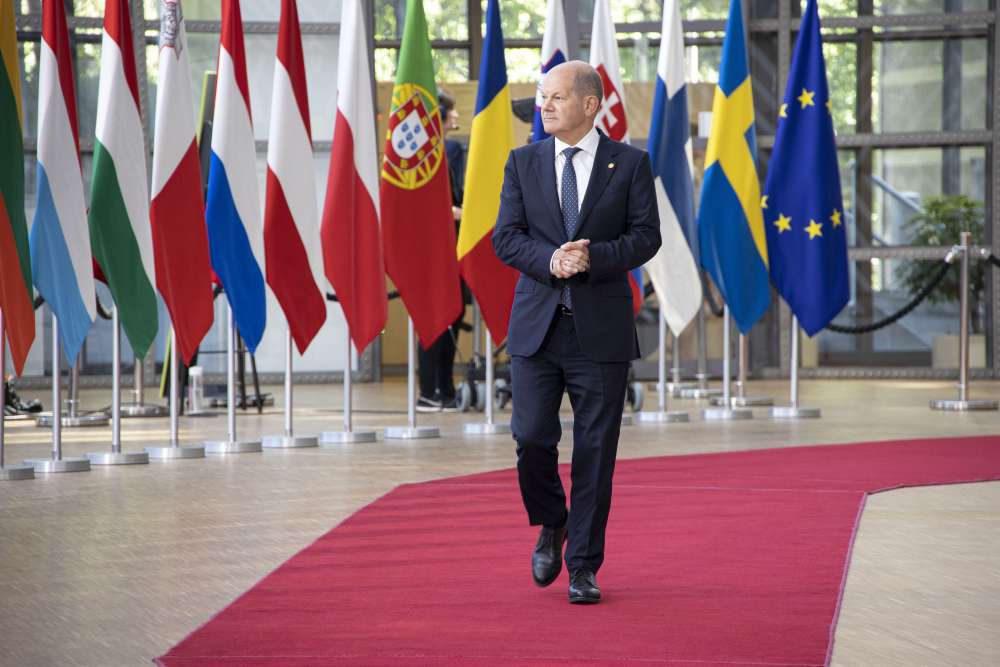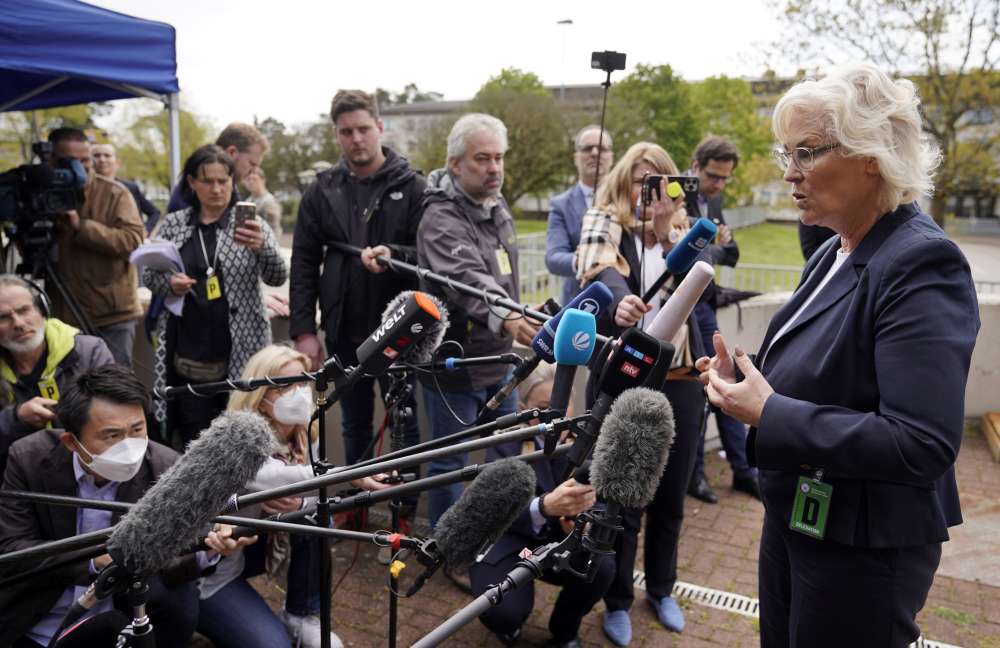Zeitenwende: What Has Been Missing From the Conversation?

(Sigmund /Unsplash)
Russia's war against Ukraine has sparked an active public debate about German and European security policy. But not all issues have gotten the same air time.
The German government is reportedly approaching the finish line in its efforts to draw up the country’s first-ever national security strategy. The current governing coalition committed to this project well before Russia’s renewed invasion of Ukraine; however, the ongoing war of aggression in Europe not only drastically changed the public debate around issues of German and European security – it also raised the stakes for the new strategy. Suddenly, Germany’s soul-searching exercise on matters of national security needed to be put into practice before anything was really put down on paper.
More than one year on from the events of February 2022, much has been said and written about Germany’s self-declared Zeitenwende, including on this site. However, some questions and issues have received more attention than others. So we asked experts: What has been missing from the conversation? What are we not talking about enough but should be going forward?
The past year’s debate around Germany’s first national security strategy has been broad and multifaceted. While the strategy is still being finalized, it seems clear that the concept of ‘integrated security’ will take center stage, and that ‘non-traditional’ security aspects like democratic resilience and economic dependencies will feature prominently in the document.
For this reason, classic ‘blind spots’ do not strike me as the main concern going forward. Instead, what Berlin is lacking so far is a serious conversation about the implications of an ‘integrated security’ approach for how the government operates and manages the interplay with other stakeholders. Effectively addressing many of the security challenges covered by an integrated approach will require a concerted effort to build competence in public institutions while simultaneously developing much stronger structures and processes to engage the private sector, researchers and civil society – both to leverage their expertise and get them on board in the implementation of strategic initiatives.
A larger consideration of the strategy’s consequences must gather pace now without delay.
As many business executives can attest, it is precisely this translation of strategic aims into an ‘operating model’ that causes many strategy processes to run into the ground. And while corporations are no strangers to institutional complexity and vested political interests, both aspects pose an even greater challenge in the context of national security. The controversy around a national security council provides a taster of the roadblocks ahead. While it is right for the debate on the content of the new strategy to precede this discussion, a larger consideration of the strategy’s consequences must therefore gather pace now without delay.
While Zeitenwende – i.e., turning point – is the appropriate term for Germany’s changing security environment, I am afraid that most people do not yet understand how enormous the challenge is that we are facing. For me, the Zeitenwende is characterized by the fundamental erosion of most of the geopolitical certainties that have underpinned German foreign policy since at least the end of the Cold War. In this sense, Russia’s invasion of Ukraine marks the definitive end of an era of geopolitical conditions to which Germany was almost perfectly adapted – politically, militarily, economically, but also intellectually. That is why this ‘turning point’ represents a greater challenge to Germany than to most other countries.
It will not be enough to simply deal with the most obvious symptoms of the Zeitenwende.
Of course, it makes sense to confront the most immediate and urgent problems first. However, it will not be enough to simply deal with the most obvious symptoms of the Zeitenwende, which has been the focus of Germany’s public debate thus far. Spending an additional 100 billion euros on the Bundeswehr, for instance, will not make much of a difference if Germany’s grand strategy remains essentially unchanged.
As Tancredi, the young character in Giuseppe Tomaso di Lampedusa’s Il Gattopardo, famously exclaimed: “If we want things to stay as they are, things will have to change.” For a status-quo power like Germany, the erosion of most aspects of the status quo requires a fundamental rethink of our strategic mindset and general world view in all parts of society, from politics and business to the media and academia.
After one year of Zeitenwende, Berlin is abuzz with talk about the coming launch of Germany’s first-ever national security strategy, and for good reason: putting Germany’s security priorities to paper certainly marks a momentous achievement. However, the document also needs a nuanced communications strategy to see it past the finish line. The question to already be asking: What comes after launch day?
At the moment (and unsurprisingly), conversations around Germany’s national security still mostly focus on the contents of the upcoming strategy itself. But a good strategy paper isn’t an end goal: it is a departure point from which to launch a long-term dialogue on Germany’s security policy. To give the strategy its sea legs both domestically and abroad, Berlin will need a robust post-launch rollout that builds on today’s momentum – and that means crafting a forward-looking, cohesive narrative and communicating it effectively over time.
Without a robust rollout, even a highly anticipated strategy can suffer a belly flop.
Without that effort, even a highly anticipated strategy can suffer from a ‘belly-flop’ effect – just look at the 2022 US National Security Strategy. Delayed by nearly a year, the Biden administration’s security strategy was discreetly published in October 2022 with little fanfare. Its lackluster release mid-way through Biden’s presidential term meant that the strategy lacked the narrative-building oomph needed to really set the US security agenda or jumpstart conversations on Washington’s defense outlook. What is more: widespread media coverage has been largely absent – which has made the strategy more of a chronicle of the status quo than a rallying cry for future policy.
The lesson to be learned from the US example: translating Berlin’s security priorities into long-term action will require not only a clear strategy, but also a sustained societal debate on what security should look like in practice. To make that happen, the German government can build on its public engagement efforts during the drafting phase and reach out to key multipliers and stakeholders both inside and – more crucially – outside of the Berlin bubble to keep the conversation afloat long after the strategy’s release.
Importantly, that effort should not fall to the Foreign Office alone – other ministries as well as Germany’s parliament, political foundations and civil society all have a role to play in driving the security debate forward post-launch. To avoid a belly flop, now is the moment for Berlin to begin building a security narrative for the future.
Studies from the Munich Security Conference confirm: people from all G7 countries see Russia’s war of aggression against Ukraine as a Zeitenwende – i.e., a turning point. This consensus underscores why it is so important to understand the many dimensions of this watershed moment. This will be especially true for Germany’s upcoming National Security Strategy – and yet, there is a real threat that the strategy will embrace a strictly traditional understanding of security in everything but semantics.
Meanwhile, the central concept for a broader understanding of security – and thus for the current Zeitenwende – has long been available: human security. Under this term, the focus of security is broadened from states and their territorial integrity to individuals and their personal well-being. Human security looks not only at military threats, but also at threats to food, health, the environment, and personal safety – all of which require non-military security instruments.
We are also experiencing a turning point in terms of human security.
The extent to which we are also experiencing a turning point in terms of human security is even measurable. Not since World War II have the human security needs of so many people worldwide been so disregarded: in 2023 alone, 339 million people are in need of humanitarian assistance. And never before has humanitarian aid worldwide been as underfunded as it has been since the start of the war in Ukraine. These facts are not the result of a one-off effect, but rather another long-term Zeitenwende: the ever-growing need for humanitarian aid is 20 times greater today than it was 20 years ago.
The debate around Germany’s security strategy must therefore address all dimensions of human security and Germany’s interests as well as values involved. What is more: pitting human security dimensions against traditional security issues must come to an end. Here, we are already seeing the concrete consequences. Already for this year, the German Federal Cabinet had planned to cut development and humanitarian aid in favor of defense spending. And while the German government is discussing a further increase of 10 billion euros per year for its defense budget in 2024, the budget for the German Federal Foreign Office – and thus for humanitarian aid – shall be cut by 28 percent.
Weiterlesen

Führung braucht Handlungsfähigkeit
Deutschland muss endlich proaktiv seine europäische und internationale Führungsrolle wahrnehmen. Dafür bedarf es einer deutschen strategischen Kultur, die langfristige Ziele in den Blick nimmt.

A little more conversation: Nur Mut zur strategischen Kommunikation
Wo sich Elvis mehr Ruhe erbeten hat, braucht Deutschland das genaue Gegenteil: mehr strategische Kommunikation. Denn StratKom stärkt die Resilienz in Demokratien und ihre Stimme auf globaler Ebene.
In der Nationalen Sicherheitsstrategie sollte die Schaffung eines Nationalen Sicherheitsrats festgelegt sein.
Braucht die Bundesregierung einen Nationalen Sicherheitsrat, um auf ressortübergreifende Krisen reagieren und langfristige strategische Ziele verfolgen zu können?